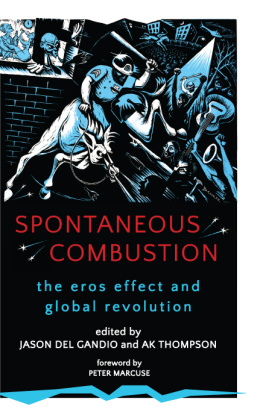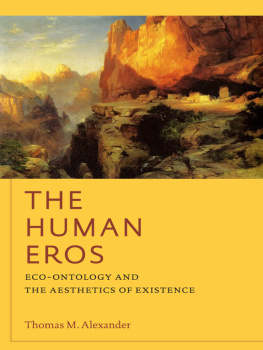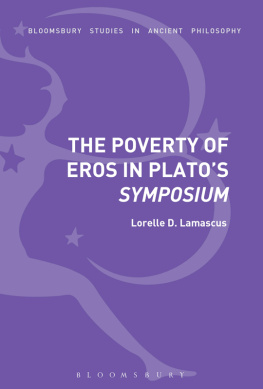SPONTANEOUS
COMBUSTION
SUNY series, Praxis: Theory in Action
Nancy A. Naples, editor
SPONTANEOUS
COMBUSTION
The Eros Effect and Global Revolution
Edited by
JASON DEL GANDIO and AK THOMPSON
Foreword by
PETER MARCUSE
Cover image of Tompkins Square police riot by Eric Drooker. For more of Eric Drookers artwork, see www.Drooker.com
Published by State University of New York Press, Albany
2017 State University of New York
All rights reserved
Printed in the United States of America
No part of this book may be used or reproduced in any manner whatsoever without written permission. No part of this book may be stored in a retrieval system or transmitted in any form or by any means including electronic, electrostatic, magnetic tape, mechanical, photocopying, recording, or otherwise without the prior permission in writing of the publisher.
For information, contact State University of New York Press, Albany, NY
www.sunypress.edu
Production, Diane Ganeles
Marketing, Fran Keneston
Library of Congress Cataloging-in-Publication Data
Names: Del Gandio, Jason, editor.
Title: Spontaneous combustion : the eros effect and global revolution / edited by Jason Del Gandio and AK Thompson.
Description: Albany, NY : State University of New York Press, [2017] | Series: SUNY series, praxis: Theory in action | Includes bibliographical references and index.
Identifiers: LCCN 2016056707 (print) | LCCN 2017023220 (ebook) | ISBN 9781438467290 (ebook) | ISBN 9781438467276 (hardcover : alk. paper)
Subjects: LCSH: Love. | Insurgency. | Revolutions. | Counterculture. | Social change. | Social movements.
Classification: LCC BF575.L8 (ebook) | LCC BF575.L8 S643 2017 (print) | DDC 306.7dc23
LC record available at https://lccn.loc.gov/2016056707
10 9 8 7 6 5 4 3 2 1
Contents
Peter Marcuse
Jason Del Gandio and AK Thompson
AK Thompson
George Katsiaficas
George Katsiaficas
Arnold L. Farr
Jason Del Gandio
Richard Gilman-Opalsky
Jack Hipp
Emily Brissette and Mike King
Gooyong Kim and Anat Schwartz
Sabu Kohso
Nina Power
Lesley Wood
AK Thompson
Douglas Kellner
Foreword
PETER MARCUSE
This is a brave book, and it tackles one of the most daunting political questions of our time: What induces people to act together in large numbers to influence the basic conditions of their life in society? And how should we understand the fact that sometimes these eruptions seem to happen spontaneously while at other times they only take place after long periods of organizing? Such eruptions are sometimes realistic and sometimes utopian. Sometimes, people act rationally in their own self-interest, and sometimes they proceed in apparently ignorant or stupid ways. Questions pertaining to the motivation underlying or impetus behind mass uprisings are not pursued by the editors and contributors to this volume out of sheer intellectual curiosity or in pursuit of a titillating topicthough it surely amounts to one: as I write, mass media in the United States express bewilderment as Donald Trump provokes massive enthusiasm for a program that shows little regard for the objective interests of constituents who seem destined to vote in a way they will surely regret.
It is in this context that Spontaneous Combustion asks a series of opposite but symmetrical questions: What produces massive support for social and political change, and how does that support explode at given moments, unpredicted by conventional explanations? How does this support become the foundation for historic revolutions, and why does it sometimes end as a flash in the pan?
Such questions remain difficult to answer. However, there seems to be general agreement that one historical factprominently elucidated by Herbert Marcuseopens the door to such events in the present: the development of societys productive and technical forces makes want, pain, and lack of basic necessities unnecessary. Consequently, the fact that these persist becomes intolerable. Today, it is not solely desperate poverty or forcible oppression that provokes protest and kicks off revolts suggesting the possibility of revolution. It is also the vision of other possibilities, the vision of a better society that is clearly feasible but not in the works, which drives the mass actions examined in this book.
To make sense of such events, the authors draw on George Katsiaficas conception of the eros effect, which picks up and takes off from concepts developed by Herbert Marcuse. This effect describes moments in which the instinctual human need for justice and freedom undergoes a massive spontaneous awakening. Drawing on Marcuse, the concept foregrounds the instinctual foundation of the desire for freedom, in which a biologically based pleasure driveerosis given free play. With Spontaneous Combustion , this seductive and provocative concept is explored through a sweeping historical overview of its elaboration followed by contributions to its theoretical development, case studies exploring its applications, and comments on some of the difficulties it may engender.
Refreshingly, the authors included in this volume make regular admissions that further work needs to be done. According to the central thesis, in which spontaneous social combustions denominated as eros effects arise from the realization that the world could be different, utopias are no longer utopianand the logical unfolding of history is not yet complete. Accepting this premise, we must ask: Why do these spontaneous eruptions occur in some times and places and not others? Is it the nature of the material circumstances, the extent of deprivation and oppression? Is it leadership? Is it an accumulation of causes? The book does not pretend to provide all the answers; it is very welcome in its lack of dogmatism.
One hopes its provocations will lead to further research, and perhaps to action as well. The book promises to be productive for a long time to come.
July 15, 2016
Introduction
JASON DEL GANDIO AND AK THOMPSON
MAKING SENSE OF MASS REVOLT
Since at least the time of the First International, questions concerning the precise character of political spontaneity and the role of spontaneous action in revolutionary transformation have provoked heated debate. From the split between anarchist and communist factions in the First International to debates between Rosa Luxemburg and Vladimir Lenin during the lead-up to the first World War, the problem has returned with a frequency that has only underscored its importance. Although Luxemburg was convinced of the need for disciplined socialist organization, her analysis of the dynamics of mass strikes alerted her to the undeniable importance of spontaneity. Recalling the general rising of the proletariat that took place in Russia in January of 1905, Luxemburg summarized its outward manifestation as nothing short of a declaration of war. Still, it was the internal or psychological transformations that seemed most compelling to her, since the actions for the first time awoke class feeling and class consciousness in millions upon millions as if by an electric shock.
And this awakening of class feeling expressed itself forthwith in the circumstances that the proletarian mass, counted by millions, quite suddenly and sharply came to realize how intolerable was the social and economic existence which they had patiently endured for decades in the chains of capitalism. Thereupon there began a spontaneous general shaking of and tugging at these chains. All the innumerable sufferings of the modern proletariat reminded them of the old bleeding wounds.















